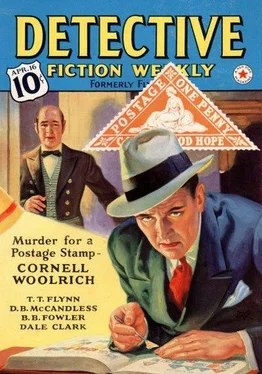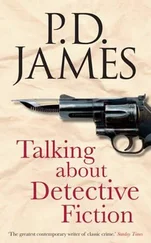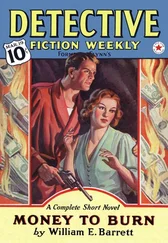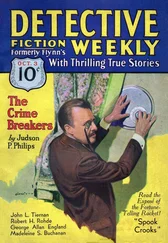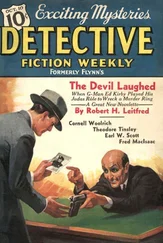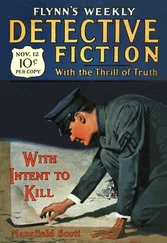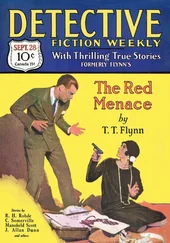Лоуренс Трит - Detective Fiction Weekly. Vol. 118, No. 6, April 16, 1938
Здесь есть возможность читать онлайн «Лоуренс Трит - Detective Fiction Weekly. Vol. 118, No. 6, April 16, 1938» весь текст электронной книги совершенно бесплатно (целиком полную версию без сокращений). В некоторых случаях можно слушать аудио, скачать через торрент в формате fb2 и присутствует краткое содержание. Город: New York, Год выпуска: 1938, Издательство: The Red Star News Company, Жанр: Детектив, на английском языке. Описание произведения, (предисловие) а так же отзывы посетителей доступны на портале библиотеки ЛибКат.
- Название:Detective Fiction Weekly. Vol. 118, No. 6, April 16, 1938
- Автор:
- Издательство:The Red Star News Company
- Жанр:
- Год:1938
- Город:New York
- ISBN:нет данных
- Рейтинг книги:3 / 5. Голосов: 1
-
Избранное:Добавить в избранное
- Отзывы:
-
Ваша оценка:
- 60
- 1
- 2
- 3
- 4
- 5
Detective Fiction Weekly. Vol. 118, No. 6, April 16, 1938: краткое содержание, описание и аннотация
Предлагаем к чтению аннотацию, описание, краткое содержание или предисловие (зависит от того, что написал сам автор книги «Detective Fiction Weekly. Vol. 118, No. 6, April 16, 1938»). Если вы не нашли необходимую информацию о книге — напишите в комментариях, мы постараемся отыскать её.
Detective Fiction Weekly. Vol. 118, No. 6, April 16, 1938 — читать онлайн бесплатно полную книгу (весь текст) целиком
Ниже представлен текст книги, разбитый по страницам. Система сохранения места последней прочитанной страницы, позволяет с удобством читать онлайн бесплатно книгу «Detective Fiction Weekly. Vol. 118, No. 6, April 16, 1938», без необходимости каждый раз заново искать на чём Вы остановились. Поставьте закладку, и сможете в любой момент перейти на страницу, на которой закончили чтение.
Интервал:
Закладка:
Two drawers were labeled Dry Flies. Bradley held his breath as he looked — and suddenly his heart was pounding and he was almost giddy with relief. Only an odd dry fly or two was left. Van Dyke had taken only what he wanted in the immediate future. The missing rods were at the small end of the rack, trout rods of course. Van Dyke had left with trout on his mind...
“Take anything you can use, Mr. Bradley.”
He was husky and couldn’t help it.
“Thank you — very generous — this big rod and — and this reel and some of these hooks. And this creel, if you don’t mind, so I won’t have to bring them back on a string...”
Anything to make talk, to have something to carry away. Bradley left the apartment with the smaller stuff inside the creel and the heavy rod case in one hand, and now he was feverish with impatience.
There wasn’t much else to do. The drab Mrs. Bradley who had never kept their walk-up flat very neat had died three years back. Bradley had not missed her much after the first month. He had taken a room, eaten out, found it to his liking.
Bradley boarded a train in the morning, taking the fishing tackle. It was a visible excuse for the trip. He had given up the room. He had few friends, none close. His trail would end at the rooming house. No one would worry about what happened to Alvin Bradley.
Precautions had to be taken. Bradley rode from Philadelphia to Indianapolis on the first ticket, and on a different railroad and fresh ticket to Chicago.
There Alvin Bradley passed out of existence.
George Henderson, from Boston registered at a modest hotel. It was George Henderson who wandered into a State Street pawn shop and purchased a second hand thirty-eight caliber automatic pistol. And later at a sporting goods store a box of cartridges.
That afternoon Bradley boarded a train for Denver. From a Denver hotel he walked out and purchased a second hand sedan, paying cash in the name of George Henderson. The dealer helped him get Colorado tags.
In the morning Bradley drove out of Denver on the winding grade that writhed up into the heart of the Rockies. Twice during the day when the road held no traffic, he got out and practiced with the gun. Now the feverishness urged him on. Suppose Van Dyke had not found things to his liking? Suppose Van Dyke had left, was getting ready to leave? This time there would be no clues. Trust Van Dyke for that.
The mountain grades were terrifying, distances seemed endless out here in the West. This vast world of great mountains, staggering vistas, lonely solitudes brought a slow pressure of uneasiness.
It occurred to Bradley when he had driven twenty miles without seeing a car that he had never been so alone before. His mouth dried out when he thought of Van Dyke and what must be done. After a little he found he could put that aside by thinking of the tens of thousands of cash money Van Dyke had along.
Then, suddenly, in the late afternoon, the crossroads was there, as Van Dyke had described it long ago. A faded sign said, Indio Springs. A poorly graded dirt road led up a lonely mountain valley sided by rocky tree-covered slopes.
Long ago Van Dyke had told it with the gleam of a fanatic in his eye.
“Star Lake, the old fellow called it, and he said the creek emptying into it was full of rainbows and the lake itself alive with fighters. Snow water, and no one ever went in there to fish. They’d have to walk the last three miles. Never be able to get a road any nearer. So I went to his place for a few days — and he hadn’t told half of it. Big ones. Fighters. The most perfect dry-fly fishing I’ll ever see. Before I left I bought his cabin and the acre of ground he owned on the lake edge. Bradley, I’m going to forget it until I retire; and then I’m going back and drop dry flies to those fighting beauties until my arm gives out or t hey’ re all gone.”
Van Dyke had never mentioned the Colorado lake again, or gone to Colorado.
Fantastic, perhaps, to be certain Van Dyke was here — but then you had to know Van Dyke’s phobia. And he had taken his dry flies. Bradley’s heart was pumping with excitement when he reached the rocky pinnacle “like a church spire” that Van Dyke had described.
There beyond the pinnacle were the rain-gutted ruts that struck up the valley slope, steep, steeper, until the low gears ground heavily, the motor labored and the sedan bounced and bucked over the road rocks. But another automobile had passed this way recently.
A mile beyond a gap in the ridge, where the road ended beside a great rocky gully, Bradley found an expensive sedan off in the brush. It bore Colorado tags, but he was calmly certain now. He took only the loaded automatic, thrusting it down inside his belt, out of sight under his coat.
Somber shadows were already darkening back in the trees. Bradley’s shoes scuffed audibly on the trail rocks. He was quickly panting. The loneliness felt like a weight crushing down. The wind soughing softly through tree tops was almost sinister, and the cold fright came back. Once Bradley thought he heard an automobile in the far distance. A mistake, of course. It was nerves. His mouth was dry again, his palms felt clammy, and a heavy knot was growing in his middle. Nerves again. When this was over, he’d never get out of sight of another human.
Then the little lake was there before him, down the slope through the trees — and he was calm. Someone was chopping wood. It stopped as Bradley moved quietly on the down-slope of the trail.
He was close before he saw the cabin huddling near the lake edge, with a thin gray spiral of smoke rising from a rock chimney.
A lean-to behind the cabin had fallen in; otherwise the years had treated it kindly. An axe had cleared new brush back some yards, and a folding canvas boat was drawn up on the stones. Van Dyke was whistling as he stepped out and started toward the boat — a tail, broad-shouldered man wearing comfortable khaki trousers, an old shirt, and a stained khaki fisherman’s hat.
A stick cracked under Bradley’s foot. Van Dyke whirled, reaching to his hip pocket.
“Hello, Van,” Bradley called.
Van Dyke stood rigidly, staring while a man might breathe twice; then slowly Van Dyke’s hand left his hip pocket. “What the devil are you doing here?”
He was shaken, suspicious, dangerous. Bradley knew fear again, but he came on, a meek, smiling little man peering through his eyeglasses.
“I... I remembered you telling about this place, Van. I had to hide and I couldn’t think of any better place.”
“Hide?” said Van Dyke in the same husky-harsh voice. He was still pale, still taut, ready for action as he looked past Bradley to see who else might be following.
“When they started checking closely to see how much you had taken, I had to leave too,” said Bradley meekly.
“You?”
“Yes.”
“You’re here alone?”
“Yes.”
Van Dyke stared — and abruptly the blood was back in his face and his laughter was incongruous and jeering.
“So you were doing the same thing! You! Alvin Bradley, the sanctimonious little rabbit had his hand in the cash all the time! I’ll believe anything now!” Van Dyke sobered and almost snarled, “Are you sure you got away clean?”
“Yes. I... I changed trains at Indianapolis, and again at Chicago, and used another name when I bought an automobile in Denver. I didn’t want to be followed, Van.”
“I suppose not,” Van Dyke muttered, staring. “But you always were a spineless fool. No imagination. Damn it, Bradley, why did you have to come here? I ought to throw you in the lake.”
“I’m sorry, Van. I’ll go away.”
“Like hell you will!” objected Van Dyke. “I’ll keep you here under my eye. Are you sure you didn’t let anyone know about this place?”
Читать дальшеИнтервал:
Закладка:
Похожие книги на «Detective Fiction Weekly. Vol. 118, No. 6, April 16, 1938»
Представляем Вашему вниманию похожие книги на «Detective Fiction Weekly. Vol. 118, No. 6, April 16, 1938» списком для выбора. Мы отобрали схожую по названию и смыслу литературу в надежде предоставить читателям больше вариантов отыскать новые, интересные, ещё непрочитанные произведения.
Обсуждение, отзывы о книге «Detective Fiction Weekly. Vol. 118, No. 6, April 16, 1938» и просто собственные мнения читателей. Оставьте ваши комментарии, напишите, что Вы думаете о произведении, его смысле или главных героях. Укажите что конкретно понравилось, а что нет, и почему Вы так считаете.
